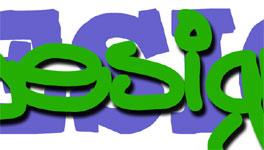Preparing
your Artwork for Printing
There
is no substitute for quality. Top
notch artwork is critical to get
"top notch" results. Choose one of
the following routes to starting off
your print order:
Option 1. We do the artwork
If you
cannot provide artwork - a
letterhead, poster or laser print
will usually suffice - our graphics
studio can translate your sketch and
hand lettering in to finished
artwork for a nominal cost.
Option 2.You do the artwork
|
We accept the following
formats for artwork. We
would need a very high
resolution version @ 300dpi:
1. Widely used picture
formats like JPG, JPEG, TIF,
or BMP,
2. Adobe Photoshop file (PSD)
3. Corel Draw file (CDR)
or Adobe Illustrator
file (AI)-
These types of files do
not use pixels or grid
like tiles to create an
image. The images are
composed of objects and
lines that are defined
mathematically, which
means you can enlarge,
reduce, rotate, reshape,
and refill without
losing the quality.
These graphics are
resolution-independent
and are a great choice.
NOTE! Please read below
if you are going to use
these files.
Create Outlines for
Adobe Illustrator or
Convert to Curves for
Corel Draw
Your fonts do not
travel with your file
with .cdr and .ai files,
and will be replaced by
whatever our default
font is when we open it.
When we read the design,
our system replaces the
font that you sent to us
with a default font.
Example: You used "Times
new Roman" in your logo
but our system defaulted
to "Arial black". Quite
a difference! To avoid
errors please "convert
all text to curves" (in
Corel) or "create
outlines"(in
Illustrator) before
sending files to us.
5.
Encapsulated Postscript
(EPS)-
Is actually Postscript
file with a preview. It
is used for storing both
object oriented artwork
and bitmapped artwork.
If an object-oriented
image is saved in the
EPS format, it will
retain its
resolution-independent
printing quality. It can
be resized, distorted,
or cropped. (This is the
BEST type of file
to send us) .
|
Please read the following carefully
if you are choosing option 2:
When
we are producing your design we have
to blow the image up to be able to
recreate the detail necessary for
crisp clean results. If your artwork
does not have enough resolution,
then seeing any detail up close
becomes difficult if not impossible
(example below).
This is an example of what happens
when you try to increase the size of
a poor quality image. We need to be
able to make a single letter the
size of your computer screen (much
bigger than shown) and yet even at
the size shown below there is not
enough detail to be able to see the
letters clearly.


Below
is an example of what kind of
resolution is necessary to be able
to recreate a great design. With
resolution like this every detail
can be accurate and the design has
its best chance at being standout!

